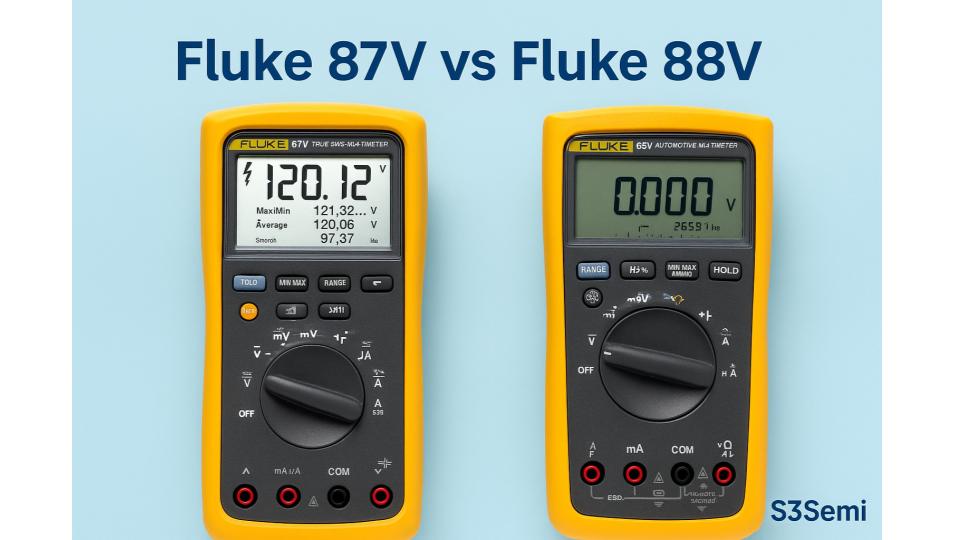Two of Fluke’s most respected models, the 87V and the 88V, are often compared because they share the same design heritage but are tailored for different industries.
🏷️ Fluke Multimeter Deals ⭐⭐⭐⭐
At first glance, these meters look nearly identical, but there are key differences in their measurement focus, safety ratings, and specialized functions. Let’s dive deeper to see which one is the better fit for your work.
🔍 Overview of the Fluke 87V
The Fluke 87V is the flagship model in the Fluke 80 Series V lineup and is designed for industrial electrical, electronic, and field service applications.
It’s known for its exceptional accuracy, wide measurement range, and ability to handle complex signals in variable-speed motor drives and noisy environments.
Key Features:
- True RMS for accurate AC readings on non-linear loads
- Measures AC/DC voltage up to 1000V and current up to 10A
- Frequency measurement up to 200 kHz
- Low-pass filter for accurate VFD (Variable Frequency Drive) readings
- Temperature measurement with included thermocouple
- Min/Max/Average recording for signal monitoring
- CAT IV 600V / CAT III 1000V safety rating
- IP30 protection and lifetime warranty
Best For: Industrial electricians, plant maintenance engineers, and electronics professionals working with high-energy or noisy electrical systems.
⚙️ Overview of the Fluke 88V
The Fluke 88V was built specifically for the automotive industry, offering all the core functions of the 87V but optimized for diagnosing electrical and electronic systems in vehicles.
It’s capable of testing everything from alternators and ignition systems to sensors and relays.
Key Features:
- True RMS accuracy for complex signals
- Measures DC voltage up to 1000V and AC/DC current up to 10A
- Includes millisecond pulse width measurement for fuel injectors
- RPM measurement (when used with inductive pickup accessory)
- Temperature measurement with thermocouple
- Min/Max/Average recording
- CAT III 1000V / CAT IV 600V safety rating
- Optional automotive test leads and accessories for convenience
Best For: Automotive technicians, mechanics, and engineers who troubleshoot and maintain modern vehicle electronics.
📊 Comparison Table
| Feature | Fluke 87V | Fluke 88V |
|---|---|---|
| Target User | Industrial & Electrical | Automotive |
| True RMS | ✅ Yes | ✅ Yes |
| Voltage Range | Up to 1000V | Up to 1000V |
| Current Range | Up to 10A | Up to 10A |
| Frequency Measurement | Up to 200 kHz | Up to 200 kHz |
| Temperature Measurement | ✅ Yes | ✅ Yes |
| Low-Pass Filter (VFD) | ✅ Yes | ❌ No |
| Pulse Width Measurement | ❌ No | ✅ Yes |
| RPM Measurement | ❌ No | ✅ Yes (with accessory) |
| Safety Rating | CAT IV 600V / CAT III 1000V | CAT III 1000V / CAT IV 600V |
| Display | Backlit LCD | Backlit LCD |
| Warranty | Lifetime | Lifetime |
| Typical Use | Industrial / Electronic | Automotive Diagnostics |
| 💳 Pricing | 💲Check Price | 💲 Check Price |
✅ Pros and Cons
Fluke 87V Pros
- Advanced low-pass filter for accurate VFD readings
- Excellent for industrial power systems and electronic circuits
- Broader frequency and voltage measurement capabilities
- Higher precision for general electrical diagnostics
- Lifetime warranty with rugged design
Fluke 87V Cons
- Lacks automotive-specific features like pulse width or RPM measurement
- Slightly more expensive than general-purpose meters
Fluke 88V Pros
- Optimized for automotive diagnostics
- Can measure RPM and injector pulse width
- Includes automotive-friendly accessories (when purchased as a kit)
- Equally rugged and reliable as the 87V
Fluke 88V Cons
- Lacks low-pass filter, making it less ideal for VFD work
- Some features only work with additional accessories
- Narrower frequency range compared to 87V
🏆 Verdict: Fluke 87V or Fluke 88V?
Both the Fluke 87V and Fluke 88V are top-tier instruments built to last a lifetime, but they’re designed for different professionals.
- Choose the Fluke 87V if you’re an industrial electrician or electronics engineer who works with VFDs, power systems, or complex electrical circuits that require precise frequency and voltage readings.
- Choose the Fluke 88V if you’re an automotive technician who regularly diagnoses ignition systems, alternators, injectors, and other vehicle electronics.
👉 In short:
- Fluke 87V = Best for industrial, plant, and field service work.
- Fluke 88V = Best for automotive diagnostics and repair.




